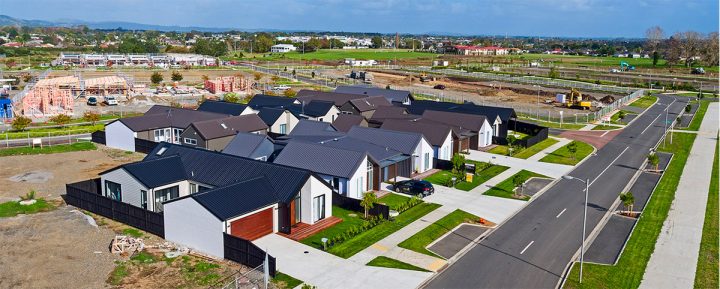The following provocation by Paul Gilberd forms one part of Financing the Future, our mixed-content and media project exploring the market opportunities for impact investment in Aotearoa New Zealand. The project is produced by Pure Advantage in association with the Impact Investing National Advisory Board Aotearoa New Zealand and the Responsible Investment Association of Australasia. Access the full project here.
Current State of the Housing Sector
The affordable housing crisis we find ourselves in has been building for over a quarter of a century. Large scale consistent Government investment in lower quartile (affordable) housing ceased after the reforms of 1991. The rapid decline in supply of affordable housing followed and we find ourselves in the midst of the most significant housing crisis New Zealand has ever seen. Whilst Government policy focuses on the ambulance at the bottom of the cliff, namely emergency and social rental housing supply, it has failed for decades to address the root cause of much of the issue which is housing affordability.
As many as 200,000 families including nurses, police officers and other key workers in society are being squeezed out of New Zealand’s cities because of a systemic failure to fund and supply affordable housing. One of the possible answers is Kiwibuild, targeted at new housing supply for the the so called intermediate buyer market, which also includes workers, such as teachers, administrators, baristas and cleaners, however, Kiwibuild on its own is unlikely to make housing affordable for moderate income families.
The focus for local and central Government and the housing industry has not been on producing affordable housing outcomes for many years. The market on its own does not deliver affordable outcomes.
There are a range of other affordable housing tenure options that alongside Kiwibuild could provide real and affordable outcomes for the intermediate housing market. These are assisted or progressive ownership products like rent to buy, shared ownership, housing cooperatives and deed restricted (inclusionary housing) tenure options.
Housing Foundation NZ is a social enterprise delivering new affordable housing, and defines affordability as paying approximately 30 percent of combined gross household income on rent or mortgage payments (if they are in home ownership). We know through independent research and experience there are a lot of social and economic benefits when people have a greater stake and ownership of their homes.
[aesop_image img=”https://pureadvantage.org/wp-content/uploads/2018/11/20Feb16Waimahia2.jpg” panorama=”off” align=”center” lightbox=”on” captionposition=”left” revealfx=”off” overlay_revealfx=”off”]Big Opportunity
One of the biggest opportunities Housing Foundation NZ see in the New Zealand housing market at present is to take existing progressive ownership models, that have been market tested and proven to work, and deliver them at scale. This begets the question why would we expend time and resources developing a new model when this one works and that we should simply do more of, more often?
For example, a recent milestone achievement in New Zealand has been the completion of the award winning Waimahia Inlet project. It is the result of an ongoing partnership with Mana Whenua Te Tumu Kainga, CORT and the Housing Foundation. Waimahia Inlet is a thriving, mixed tenure community of nearly 300 homes. This community embodies all aspects of Housing Foundation’s values and capability as an innovator and leader of social change, through delivering affordable housing outcomes.
Overall, the operating performance of this social enterprise model has been outstanding by almost every measure. The long term social impact delivers positive outcomes far beyond the individual households in other affordable housing programmes. Independent research shows the long term health, education and quality of life benefits supported by these products and and investment in the programmes, significantly reduce the long term net fiscal liability to the Crown.
Our experience of working with motivated low income households, who face economic hardship and lack access to sustainable affordable housing, is that when they are provided with a chance to improve their lives by way of this type of programme, the changes that occur strongly motivate them to keep working towards their goal of a better future. Safe secure affordable housing is life changing and programmes that were designed to run for 10 to 15 years are being routinely completed in less than 5 years.
How can Impact Investment unlock these opportunities?
The single greatest barrier to scaling the delivery of these successful pathway products and services is access to long term low interest capital. Impact investment into this space can make an enormous difference. For example, over the last 10 years, The Tindall Foundation has issued total loans of around NZ$10 million to Housing Foundation NZ for development capital needs. This facility allows Housing Foundation to progress developments that would not usually attract traditional loans from commercial banks due to strict lending criteria.
By utilizing The Tindall Foundation capital injection into the development, Housing Foundation has been able to leverage larger sums of funding from more traditional sources. To date Housing Foundation has leveraged $300m and delivered real housing outcomes by applying that funding directly into the development and supply of new housing and pathway products across New Zealand.
Impact investing can be the opportunity for people to fulfil their potential to own a home and enable security and stability regardless of their background.




Leave a comment